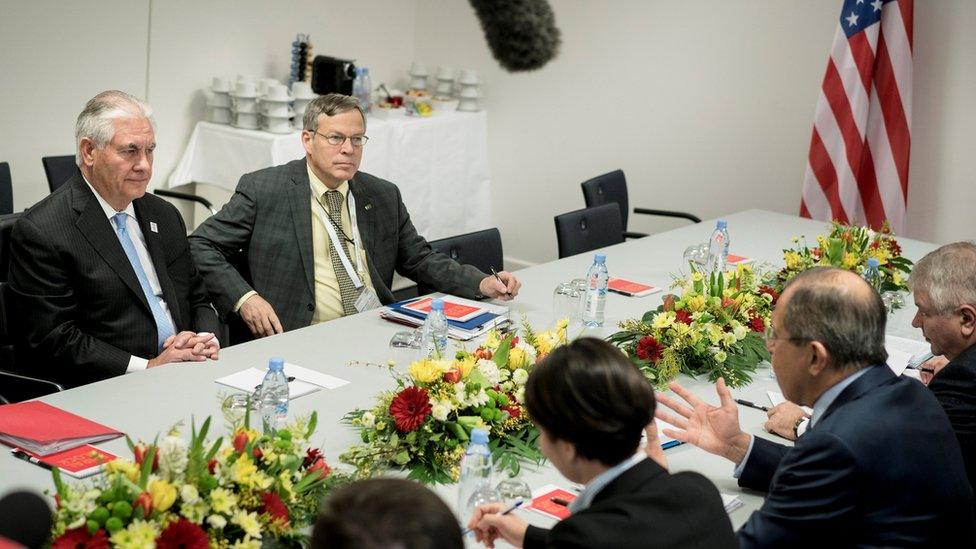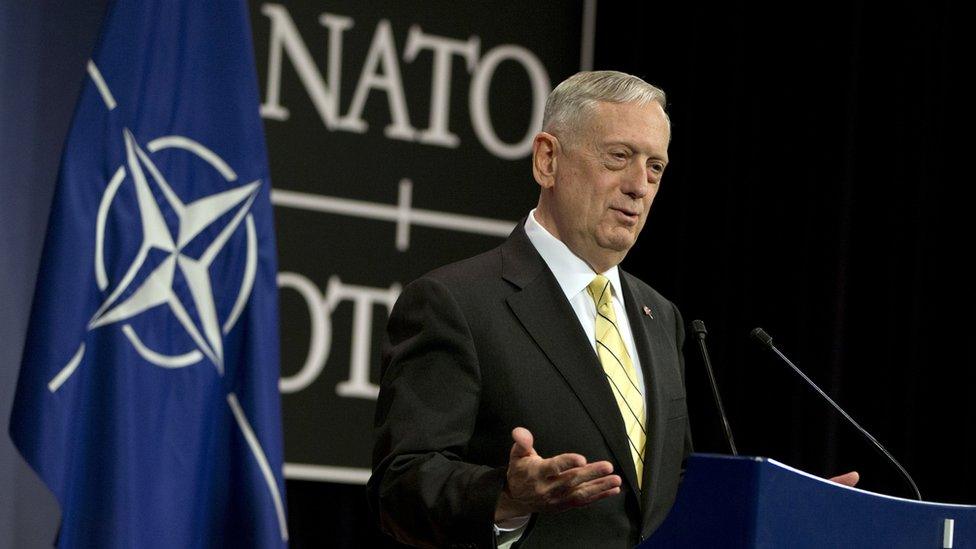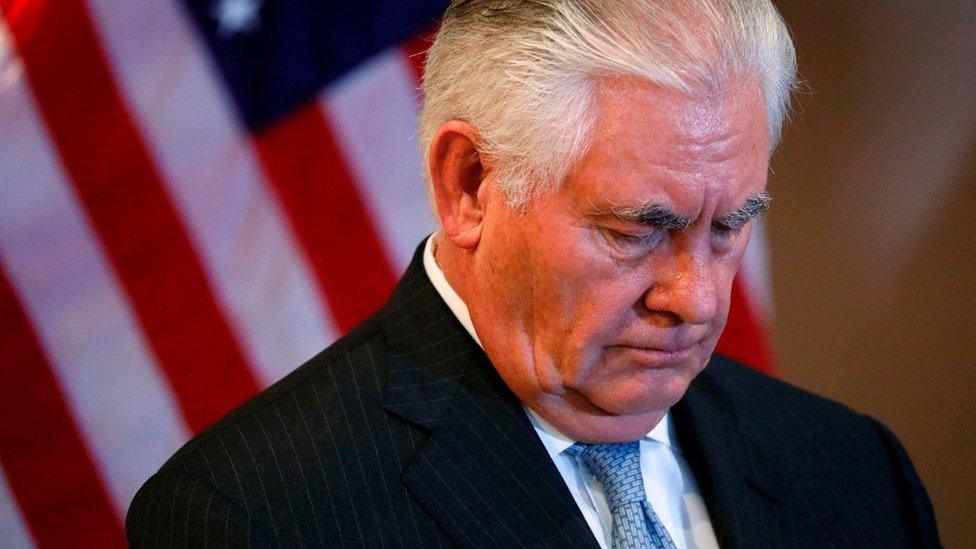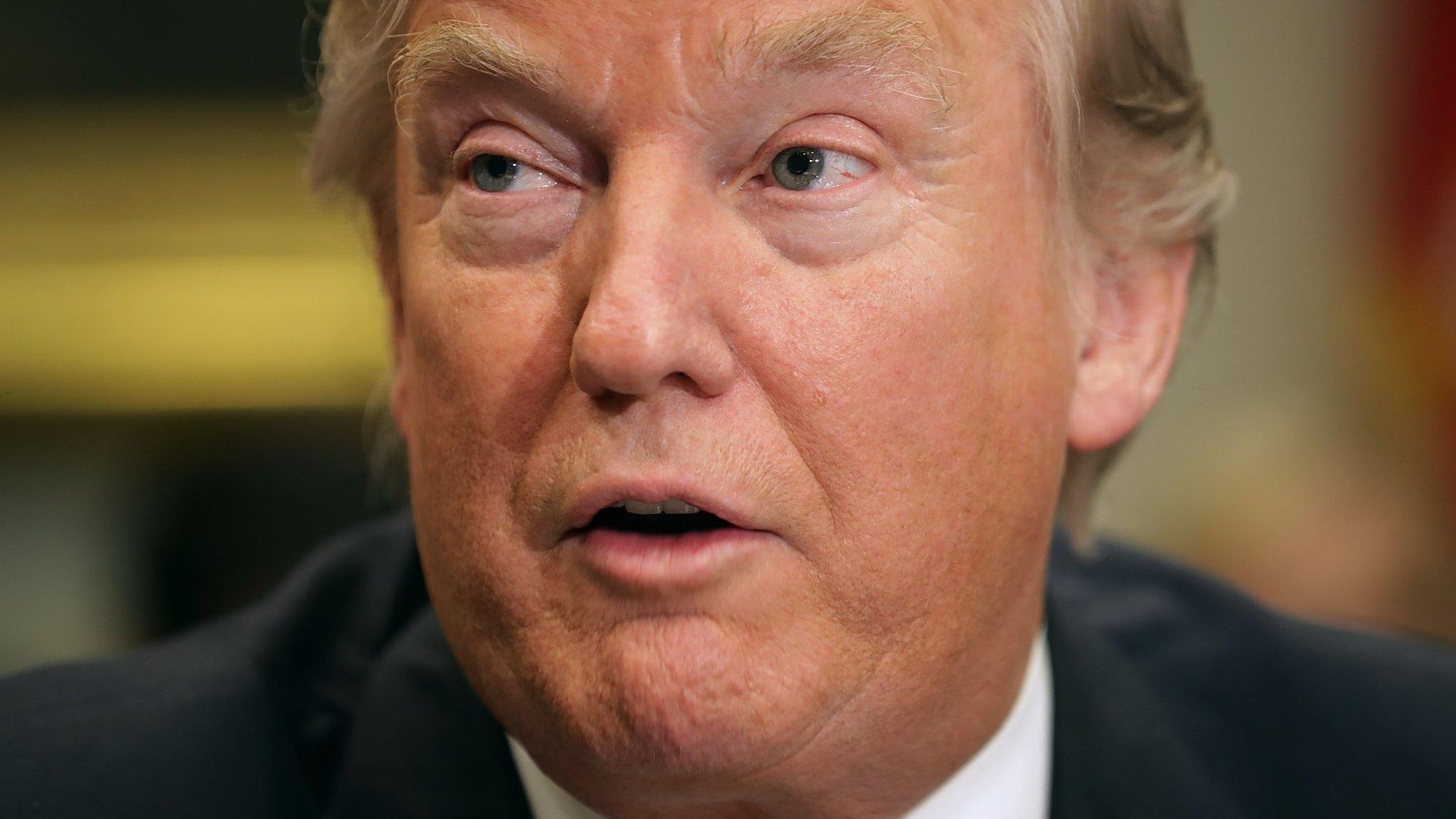Tillerson and Mattis in guarded approach to Russia
- Published

Mr Tillerson (left) said Russia should honour its commitments on the Ukraine conflict
Senior US officials have been setting out their position on Russia, in some of the new administration's first diplomatic moves.
Secretary of State Rex Tillerson said the US would consider working with Russia in some areas but would stand up for its own interests.
Meanwhile, US Defence Secretary James Mattis said Washington was not ready to collaborate militarily with Moscow.
US President Donald Trump has called for improved ties with Moscow.
But the new administration's diplomatic initiative comes as questions are raised about the Trump team's dealings with Russia dating back to last year's election campaign.
US intelligence services have concluded that Moscow hacked into emails of President Donald Trump's Democratic opponents during the election.

Tillerson, the Quiet Man - Analysis by Barbara Plett Usher, BBC State Department Correspondent
Rex Tillerson may be on a steep learning curve in the transition from oil executive to top diplomat. But the State Department press corps is also adjusting. We'd become accustomed to the garrulous John Kerry, now we have his opposite: The Quiet Man.
So far Mr Tillerson has spared only a few words for us, a "Good Morning, y'all" as we boarded the plane in Washington. And he diligently refused to respond to questions shouted out during brief moments of press access at the beginning of his meetings in Bonn, Germany.
So we gleaned what we could: he chatted about his flight with the Saudi foreign minister and about jetlag with the Turkish foreign minister. Boris Johnson, the British Foreign Secretary, made him laugh with a joke about the Commonwealth.
"Good try," Mr Johnson muttered as we lobbed another question, prompting more laughter but no answer. We were heartened when Russian Foreign Minister Sergei Lavrov made opening remarks, and perplexed when we were ushered out just as Mr Tillerson began to respond.
He did give us a 43-second statement on Russia afterwards. And eventually a few spontaneous words as the questions continued. All in a hard day's work

And three of Mr Trump's aides have been forced out over allegations about their links with Russia, including National Security Adviser Mike Flynn earlier this week.

Gen Mattis said there was little doubt Russia had interfered in Western elections
Mr Tillerson met Russian Foreign Minister Sergey Lavrov on the sidelines of a G20 meeting in Germany as part of his first foreign trip in his new job.
He said the US was willing to co-operate with Russia if Moscow lived up to its commitments.
"As I made clear at my Senate confirmation hearing, the United States will consider working with Russia when we can find areas of practical co-operation that will benefit the American people," he said.
"Where we do not see eye to eye, the United States will stand up for the interests and values of America and her allies.
The secretary of state added that he expected Russia to honour its commitment to the Minsk agreements aimed at ending the conflict in Ukraine, and to work to stabilise the region.
Russia's role in backing separatists in the east of the country has soured relations with the West since the conflict began in 2014.
Mr Lavrov said the two sides had agreed to co-operate in areas where their interests coincided, particularly in the fight against terrorism, over Syria and in other countries in the Middle East where "terrorism has put down roots".
However, he said that they did not discuss US sanctions against Russia, first imposed when Moscow annexed Crimea from Ukraine nearly three years ago.
Mr Tillerson, who as ExxonMobil CEO was perceived to be close to the Russian leadership, told his nomination hearing in the Senate that he would consider reviewing the sanctions.

Read more

Mr Tillerson also met the UK's Boris Johnson and other foreign ministers from the G20, made up of developed economies and emerging nations including China, India, Indonesia, Mexico, South Africa and Brazil.
At a Nato meeting in Brussels, Gen Mattis rejected calls by Russian Defence Minister Sergey Shoigu to "restore co-operation with the Pentagon".
"We are not in a position right now to collaborate on a military level, but our political leaders will engage and try to find common ground or a way forward," he told reporters.
The defence secretary said that Russia had to abide by international law, adding that there was "little doubt" that Moscow had interfered or attempted to interfere in several Western elections.
- Published13 March 2018

- Published15 February 2017
